英语课堂实录1
小学英语课堂实录(1)
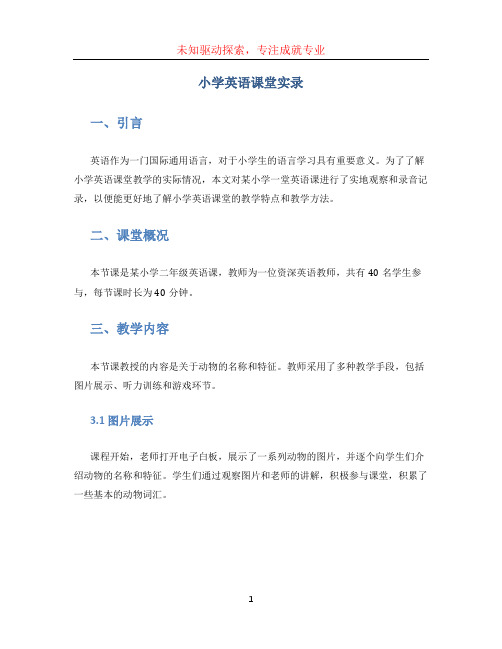
小学英语课堂实录一、引言英语作为一门国际通用语言,对于小学生的语言学习具有重要意义。
为了了解小学英语课堂教学的实际情况,本文对某小学一堂英语课进行了实地观察和录音记录,以便能更好地了解小学英语课堂的教学特点和教学方法。
二、课堂概况本节课是某小学二年级英语课,教师为一位资深英语教师,共有40名学生参与,每节课时长为40分钟。
三、教学内容本节课教授的内容是关于动物的名称和特征。
教师采用了多种教学手段,包括图片展示、听力训练和游戏环节。
3.1 图片展示课程开始,老师打开电子白板,展示了一系列动物的图片,并逐个向学生们介绍动物的名称和特征。
学生们通过观察图片和老师的讲解,积极参与课堂,积累了一些基本的动物词汇。
3.2 听力训练接着,老师播放了一段录音,录音中包括了一些动物的叫声和简短的描述。
学生们通过仔细聆听并观察图片,试图判断录音中提到的是哪些动物。
这个环节既锻炼了学生的听力能力,又增加了他们对动物的理解。
3.3 游戏环节为了加深学生对动物的记忆和理解,老师设计了一个游戏环节。
老师将学生分成小组,每个小组根据老师给出的动物名称,自由选择对应的图片并进行展示。
其他小组通过观察图片猜测动物的名称,增加了学生们的互动和竞争性。
四、教学方法分析本节课采用了多种教学方法,既有视觉呈现,又有听觉训练和游戏互动。
这种多元化的教学方法符合小学生的认知特点,帮助他们更好地理解和记忆英语单词。
4.1 视觉呈现通过展示图片,学生们可以直观地认识到动物的外貌特征和名称,并能够根据图片猜测动物的名称。
视觉呈现不仅提供了一种具体的感知形式,还能够激发学生的学习兴趣和主动性。
4.2 听觉训练听力训练可以帮助学生们更好地理解英语录音,同时锻炼他们的听力能力。
通过与图片的对比,学生们能够更好地记忆和理解动物名称及其特征。
4.3 游戏互动游戏环节的设置不仅能增加学生的参与度,还能培养他们的团队合作能力和竞争意识。
学生们通过亲自选择图片、展示和猜测,不仅增强了对动物名称的记忆,还提高了对英语的运用能力。
小学英语课堂教学优秀案例
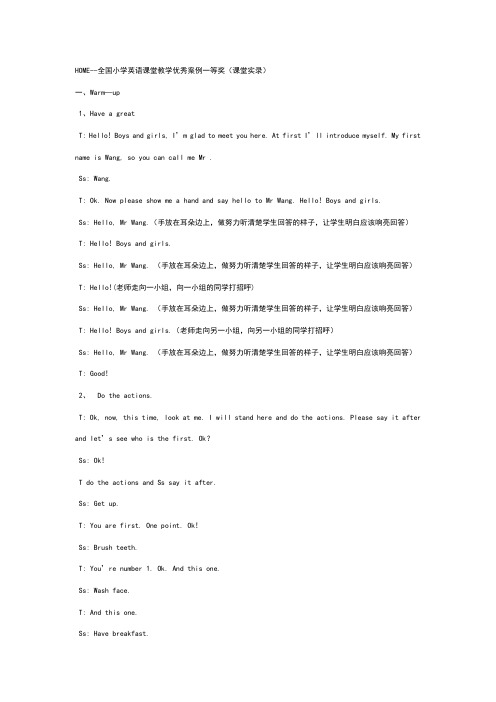
HOME--全国小学英语课堂教学优秀案例一等奖(课堂实录)一、Warm—up1、Have a greatT: Hello! Boys and girls, I’m glad to meet you here. At first I’ll introduce myself. My first name is Wang, so you can call me Mr .Ss: Wang.T: Ok. Now please show me a hand and say hello to Mr Wang. Hello! Boys and girls.Ss: Hello, Mr Wang.(手放在耳朵边上,做努力听清楚学生回答的样子,让学生明白应该响亮回答)T: Hello! Boys and girls.Ss: Hello, Mr Wang. (手放在耳朵边上,做努力听清楚学生回答的样子,让学生明白应该响亮回答)T: Hello!(老师走向一小组,向一小组的同学打招呼)Ss: Hello, Mr Wang. (手放在耳朵边上,做努力听清楚学生回答的样子,让学生明白应该响亮回答)T: Hello! Boys and girls.(老师走向另一小组,向另一小组的同学打招呼)Ss: Hello, Mr Wang. (手放在耳朵边上,做努力听清楚学生回答的样子,让学生明白应该响亮回答)T: Good!2、 Do the actions.T: Ok, now, this time, look at me. I will stand here and do the actions. Please say it after and let’s see who is the first. Ok?Ss: Ok!T do the actions and Ss say it after.Ss: Get up.T: You are first. One point. Ok!Ss: Brush teeth.T: You’re number 1. Ok. And this one.Ss: Wash face.T: And this one.Ss: Have breakfast.T: And this oneSs: Rollerblade.T: Yes, right. rollerblade. I like sports.Ss: Play basketball.T: Play basketball.Ss: Sing a song.T: And this one. Oh.Ss: Play computer games.T: Yes, you did a good job. It’s right. Now, I wil l play the computer.二、Presentation1、Learn new phraseT: Ok! Wow! It’s a wonderful picture. Is it niceSs: Yes.T; Is it cleanSs: Yes.T: It’s my home. It’s really tidy and clean. Why Because me. I’m very hard working. I’m very hard working.(老师边系围裙边说) Every day, I make the bed. Please wait for me. Ok. It’s so hard to—ok.(老师做出围裙很难系的样子,让学生理解hard的意思) Let’s go. I empty the trash, look, I’m good. I cook meals. Look, the chair is so heavy, but I’m strong , I can move the chair. Now please look at here. (teacher write “ I can” on the blackboard) I can .Ok, now, this one ,look , sweep the floor. (teacher write “ I can sweep the floor” on the blackboard)I can sweep the floor. Ok, good, please read after me. I can sweep the floor.Ss: I can sweep the floor.T: I can sweep the floor.Ss: I can sweep the floor.T: What’s this (T shows his hand and ask)Ss: Hand.T: It’s not hand. It can change the voice. It’s magic. Look, if I put my hand down , you say lowly, lowly, lowly; if I put my hand up, up, up, up, up, up, you read louder, louder, louder. UnderstandSs: yes.T: Ok. I can sweep the floor.(老师用手势表示,让学生由低到高,再由高到低读这个句子10遍)T: Good. Ok. Look here. Ok, I can sweep the floor. Who can sweep the floor You please.S1: I can sweep the floor.T: You ar e helpful at home. This is for you. But put it down. Don’t look at it. Ok, look at this. Ok ?Now , who can wash the dishes Ok, you.S2: I can wash the dishes.T: Do remember. There is it(示意学生用话筒回答)S2:I can wash the dish.T: Good, dishes. Ok, now, dishes.S2: Dishes.T: ok, now, this is for you. And this one. Set the table, set the table, who can set the table You please.S3: I can set the tale.T: I can set the tale .Ok, now, here you are. And this one. You needn’t , you needn’t, needn’t .Ok, here, who can make the bed(手放在耳朵边上,引导学生说出Let me try,激活课堂氛围)Ss: Let me try.(小声)T: You please.S4: I can make the bed.T: I can make the bed. Ok, this is for you..S4: Thank you.T: And this one. Wash clothes, wash clothes.Ss: Let me try. Let me try.(大声)T: please.S5: I can wash clothes.T: Ok, now, here you are.S5: Thank you!T: Oh, just now I cook meals. Ok, you please.S6: I can cook meals.T: Now, here you are. Ok ! this one, this one, water the flowers.Ss: Let me try. Let me try. Let me try. Let me try. Let me try. Let me try.(更大声) T: Ok, there, you please. That boy.S7: I can water the flowers.T: Good, only one, only one. Ok.Ss: Let me try.S8: I can empty the try.T: Trash.S8: Trash.T: Ok, show me a hand and read after me. Trash.S8: Trash.T: Trash.S8: Trash.T: Trash, trash, trashS8: Trash, trash, trashT: Ok, oh, I have no card now. Get them back.2、GuessingT: Now, you can look at it.S1: Yes.T: Can you sweep the floor?S1: No, I can’t.T: Can you wash clothes?S1: No, I can’t.T: Can you cook meals?S1: No, I can’t.T: Oh, my gold, can you water the flowers?S1: No, I can’t.T: Can you make the bed?S1; Yes, I can.T: Yeah, I got it. Ok, yes, make the bed. Where are my cards Ok, put, put down. Ok, there. Can you make the bed No, there. Can you water the flowers?S2: No, I can’t.T: Oh, can you I’m sorry, who can help me I forgot it. Help me Ok, you please.S3: Can you sweep the floor?T: Once more.S3: Can you sweep the floor?S2: No, I can’t.S3: Can you water the flowers?S2: No, I can’t.T: And who can one point. Ok, you please.S4: Can you cook meals?S2: Yes, I can.T: Do this.S4: yeah!(做胜利的手势)T: And here. Can you ask her You ask her.S5: Can you wash clothes?S6: No, I can’t.3、Learn new sentenceT: Ok, please listen to me. Can you wash the clothes Every one look at here. (teacher write “Can you wash the clothes” on the blackboard)Can—you—wash—the—clothes Please, you should read in this way. Can –you—wash—the—clothes↑ Remember. Can –you—wash—the—clothes↑Can you wash the clothes ↑(升调,老师有又夸张的手势表示,像大合唱时的指挥家一样,由慢到快)Ss: Can –you—wash—clothes↑ Can –you—wash—clothes↑Can you wash clothes ↑Ss: Can you wash clothes ↑(学生根据老师的指挥,由快到慢,再由慢到快,一起读了9遍)T: Remember it. Can you wash clothes ↑(老师又边说边做,慢速的说了一遍)Can you show your hand and have a try Ok, come here and show your hand. Ok, I think you can you can do it.S1: I think I can.T: Ok, come here.S1 do and the other Ss say.T: Let’s go on. Remember here.S1 do it again. Ss say it again.T: Ok, thank you. Now give me victory.S1: Yeah!T: Ok , good . another student come here and do . come here , you please .S2 Do 2 times Ss say 2 times .T: Ok .S2: Yeah !3、 Read and answerT: Ok , now this tim e . I will introduce you two new friends here . Let’s look at it . Ok , here , look , this is Sally and that is Tom . Tom is a boy and Sally is a girl . but I have five questions ask you .look first one .Can Tom cook mealsCan Sally water the flowersCan Sally make the bedWho can cook mealsWho can sweep the floor ?Please listen and answer my questions . now .Ss listen to tape .Tape:Sally: You are helpful at home?Tom: Yes, I can sweep the floor and empty the trash.Sally: Can you cook meals?Tom: No, I can’t. but I can wash the dishes and set the table. What can you do at home?Sally: I can wash clothes, make the bed, and water the flowers.Tom: That’s good. Can you cook meals?Sally: Of course, I can. Sometimes I cook for my parents.T: Ok , this time . Please look at the dialogue . ok , look at it . All of you have the dialogue on the paper . But , now please look at the paper and answer the question . Ok ,now let’s talk about it , ok Group work. Ok, talk about it . Ok .T: First one can Tom cook meals You can by the answer for the line .ok (走向一个小组参与活动)T: Can Tom cook meals No , he can’t . good . (走向另一个小组参与活动)T: This one . talk about it . can Sally water the flower Yes or no Find the answer from the dialogue.(走向第三个小组参与活动)S1: Yes, she can.T: Ok, 3、4、5 you can read. Ok?T: Ok, ok, ok, let’s wait for there.T: Ok, first question, can Tom cook meals you please.S2:No, he can’t.T: No, he can’t. Yes, you are right. Number 2 Can Sally water the flowers t hat boy.S3: Yes, she can.T: Yes, she can. Let me see. Good! Number 3 Can Sally make the bedSs: Let me try.T: Ok, you please.S4: Yes, she can.T: Good, next one, Who can cook mealsS5: Let me try.T: You please.S5: Sally can cook meals.T: Ok, let’s see, ok, yes. Yes, wonderful. You are right. Number 5 Who can sweep the floor? Ss: Let me try.T: You please.S6: Tom can.T: Let’s see, yes or no Ok, Tom. Good job.4、guessingT: Ok, now, you do read job. Now let’s play a game. Where’s where are my cards Give them back to me. 1、2、3、4、5、6、7、8good. Now I need your help. Who want to come here You please. Ok, hold it and remember it .Let’s read.Ss: Water the flowers sweep the floor set the table empty the trash wash the clothes make the bed cook mealsT: You hold in, I will choose one. I don’t look at it ,I guess. lf I guess right, you say yes I can , if I guess wrong you say no I can’t . Can you wash clothes?Ss: No, I can’t.T: Can you sweep the floor?Ss: No, I can’t.T: Can you cook meals?Ss: No, I can’t.T: Can you make the bed?Ss: No, I can’t.T: Water the flowers here. Can you come here Guess. You come here. Choose one. Don’t look, please guess.S1: can you make the bed?Ss: No, I can’t.S1: Can you sweep the floorSs: No, I can’t.S1: Can you water the flowers?Ss: No, I can’t.T: Only one time.S1: Can you set the table?Ss: No, I can’t.T: Go back, have next time. Who can come here Ok, let me try.Ss: Let me try.T: You please.S2: Can I sweep the floor?T: Can you can you.S2: Can you sweep the floor?Ss: No, I can’t.S2: Can you make the bed?Ss: Yes, I can.T: Ok, next, only, ok, who want to come here O k, you please, that boy.S3:C an I wash the dishes?Ss: No, I can’t.S3: Can you set the table?Ss: No, I can’t.T: Can you sweep the floor?Ss: No, I can’t.T: Only one time.S3: Can you empty the trash?Ss: No, I can’t.T: 1、2、3、4 cards, you please.T: Look at it . set the table empty the trash wash the dishes sweep the floor ok, you hold it. S4: Can you sweep the floor?Ss: Yes, I can.T: You’re so clever!S4: Yeah!T: Ok, three, one two three, three cards. That’s very very very easy, you please. One, only one. Ok and help you.S5: Can you set the table?Ss: No, I cant.S5: Can you empty the trash?Ss: No, I cant.T: You needn’t. only one card. empty the trash Wash the dishes hold it.T: I do it. Can you empty the trash?Ss: Yes, you can.T: Yeah, I’m clever .5、Do and sayT: Now we have no cards. You go back. Who can do the action and we guess. You ask can you (T do the actions “ play basketball”)Ss: Play basketball?T: Can you do the actions Come here, ok you please. Ok.S1 do the actions.T: Let me try, let me try. Can you sing?S1: No, I ca n’t.S2: Teeth?S1: Yes, I can.T: Brush teeth?S1: Yes.T: I think you are singing. And .S3: Let me try.T: You please.T: I will sit here, this is my seat.S3 do the action.S4: Can you play the football?S3: Yes, I can.T: Good, you can do this.S3: Yeah!T: And you please.S5 do the action.Ss: Let me try.S6: Can you play basketball?S5: Yes, I can.T: Ok, this time we have know I can do you can do but do you know what your mother do ? S7: Let me try.T: You please.S7: My mother can play the piano.T: Piano, wonderful, good.S8: My mother can cook meals?T: Cook meals ,ok , you please.S9: She can do house work.6、 interview your classmatesT: Ok please look here. Ok, wait a moment. Here , I will ask . Ok you please listen to me . What can you doS1: I can I can water the flowers.T: Water the flowers,1、2、3, Ok here.( T write 8 on the paper)You go on. What can your mother do?S1: My mother can set the table.T: Oh, your mother can set the table. Where is it I c an’t find it. Ok, here. (Write 5 on the paper. )Last one what can your father doS1: My father can cook meals.T: Cook meals I will write here , three. (Write 3 on the paper) Do you want to ask You can ask your best friend in your group. Now ask and write down the answers.Ss do pair workT: Use it .(示意学生用话筒)T: You can stand up and ask your friend .Who can stand up and ask your friend ?Ss: Let me try let me try .T: That boy you please . who’s your friend ok , you pleaseS1: What can you doS2: I can cook meals .S1: What can your mother do ?S2: She can sweep the floor .S1: What can your father do ?S2: He can make the bed .T: Good , wonderful , thank you !Ss: Let me try .T: Ok, you please .S3: What can you do ?S4: I can sweep the floor .S3: What can your mother do ?S4: My mother can cook meals .S3: What can your father do ?S4: He can water the flowers .T: Ok , good .Ss: Let me try .T: You please .S5: What’s can you do ?T: What not what’s , what ca n you do ?S5: What can you do ?S6: I can sweep the floor .S5: What can your mother do ?S6: She can wash clothes .S5: What can your father do ?S6: He can cook meals .T: Ok , last group .Ss: Let me try .S7: What can you do ?S8: I can sweep the floor .S7: What can your mother do ?S8: She can wash clothes .S7: What can your father do ?S8: He can cook meals .T: Ok , this time , let’s see . ok , can you see Ss: Yes , I can .T: Can you climb ?Ss: Yes , I can .T: Can you rollerblade ?Ss: Yes , I can .T: Can you dance ?Ss: No , I can’t .3、ConsolidationT: Ok , this time , let’s sing , ok please the first time . ok , just a moment , ok , sorry , please wait . now look have song for you first time listen .Ss listen .T: Can you sing ?Ss: Yes , I can .T: Let’s sing and do the actions . Ok , climb ride a bike rollerblade . ok .Song: Can you climb ?Yes , I can . yes , I can .Can you sing ?Yes , I can . yes , I can .Can you ride a bike ?Yes , I can .Can you dance ?No , I can’t . no , I can’t .Can you swim ?Yes , I can . yes , I can .Can you sing ?Yes , I can .Can you rollerblade ?Yes , I can . yes , I can .Can you dance ?No , I can’t . no , I can’t .Ss: Sing together .T: Ok , are you happy today ?Ss: Yes .T: I’m very happy. Please say hand wavingGoodbye!Ss: Bye .T: Bye bye .Ss: Bye byeT: Bye bye .Ss: Bye byeT: Ok ,please stand up , and say good bye to teachers , ok . Ss: Goodbye teachers .。
小学英语课堂实录
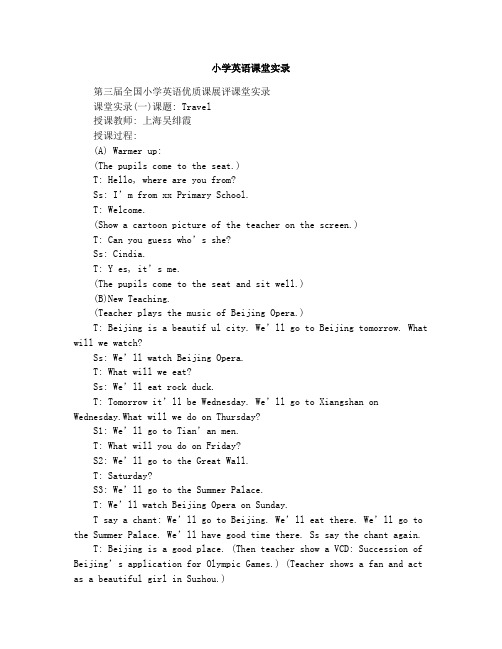
小学英语课堂实录第三届全国小学英语优质课展评课堂实录课堂实录(一)课题: Travel授课教师: 上海吴绯霞授课过程:(A) Warmer up:(The pupils come to the seat.)T: Hello, where are you from?Ss: I’m from xx Primary School.T: Welcome.(Show a cartoon picture of the teacher on the screen.)T: Can you guess who’s she?Ss: Cindia.T: Y es, it’s me.(The pupils come to the seat and sit well.)(B)New Teaching.(Teacher plays the music of Beijing Opera.)T: Beijing is a beautif ul city. We’ll go to Beijing tomorrow. What will we watch?Ss: We’ll watch Beijing Opera.T: What will we eat?Ss: We’ll eat rock duck.T: Tomorrow it’ll be Wednesday. We’ll go to Xiangshan on Wednesday.What will we do on Thursday?S1: We’ll go to Tian’an men.T: What will you do on Friday?S2: We’ll go to the Great Wall.T: Saturday?S3: We’ll go to the Summer Palace.T: We’ll watch Beijing Opera on Sunday.T say a chant: We’ll go to Beijing. We’ll eat there. We’ll go to the Summer Palace. We’ll have good time there. Ss say the chant again.T: Beijing is a good place. (Then teacher show a VCD: Succession of Beijing’s application for Olympic Games.) (Teacher shows a fan and act as a beautiful girl in Suzhou.)T: Where am I from?Ss: Suzhou.T: Where have you visited in Suzhou? Can you say something?S1: LiuY uan.S2: Shi Zilin.S3: Han Shansi.T: Y ou have some pictures on your desk. You can say where you will go.(The pupils say the sentences in the groups.)T: Where will you go?S1: I’ll go to Liu Y uan.T: What will you see?S1: I’ll see many flowers.T: There are many beautiful places in Suzhou. Have you got friends in other city?Ss: Y es.(Teacher shows a postcard.)T: Look at the postcard. On the postcard what can we write?S1: We are in Suzhou.(Teacher writes the sentence on the card.)T: Suzhou is a beautiful city. There are lots of trees. I love this city.(Ss write the postcards in groups and teacher plays the tape of the music.)Then each group give a report.(Teacher shows a picture of Hanshan Temple.)T: What’s this?Ss: Hanshan Temple.T: I love the place. Do you know why? (Play the tape of music)T: Do you want to Hanshan Temple? Look at the map of Suzhou. Hanshan Temple is here. (Show the map of Suzhou and Hanshan Temple.) T: How can we go there? Walk there? By foot? No.S1: We’ll go there by car.S2: We’ll go there by bike.T: And?S3: We’ll go there by motorcycle.S4: We’ll go there by car.T: Look, this is a plan for visiting Suzhou. Let’s finish this form together.(Show a big form on the blackboard.)A Plan For V isiting Suzhouwherewhenhowphotos card(Teacher and the pupils finish the form together. And the pupils come to the front and stick the photos and cards in the form. Thenpupils give a report.)T: Welcome to Suzhou.课堂实录(二)课题:Festivals授课教师四川何霞Ⅰ.Warming up:T: Good morning, boys and girls.Ss: Good morning, teacher.Ⅱ.New Teaching:T: What do you know about some festivals?S1: Children’s Day.T: Good.S2: Teacher’s Day.T: Wonderful.T: What is the most important festivals in China?S3: Spring Festival.T: What is the most important festivals in USA?S3: Christmas.T: Let’s say something about Christmas.S4: Snow.S5: Tree.S6: Presents.S7: Food.(板书)T: I have a student. His English is poor. His name is Jason. Now there is a letter. Let’s read it and help him. (教师领读,学生跟读。
unit1__My_classroom课堂实录 (1)
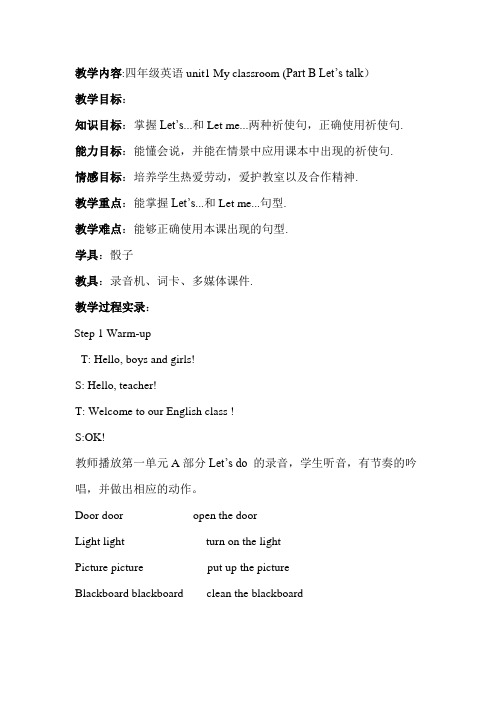
教学内容:四年级英语unit1 My classroom (Part B Let’s talk)教学目标:知识目标:掌握Let’s...和Let me...两种祈使句,正确使用祈使句. 能力目标:能懂会说,并能在情景中应用课本中出现的祈使句.情感目标:培养学生热爱劳动,爱护教室以及合作精神.教学重点:能掌握Let’s...和Let me...句型.教学难点:能够正确使用本课出现的句型.学具:骰子教具:录音机、词卡、多媒体课件.教学过程实录:Step 1 Warm-upT: Hello, boys and girls!S: Hello, teacher!T: Welcome to our English class !S:OK!教师播放第一单元A部分Let’s do 的录音,学生听音,有节奏的吟唱,并做出相应的动作。
Door door open the doorLight light turn on the lightPicture picture put up the pictureBlackboard blackboard clean the blackboard(教师带领学生边吟唱边做动作表演,这样可以通过全身反应法使学生很快进入学习英语的良好状态。
)Step 2 lead_ in教师用做动作猜词的游戏,复习词组clean the windows 等,与此同时引入clean the teacher’s desk .如:T(站到窗户旁边做擦玻璃状):What do I do?S:Clean the windows.T:Yes,Clean the windows.(把词组卡片贴到黑板)T:(站到门的旁边)What do I do?S:Clean the door.……最后引入clean the teacher’ s desk的学习.(教师通过猜词的游戏师生互动,复习引入学生的学习,并激发学生的兴趣.)Step 3 Presentation1、整体呈现.教师播放Let’s talk的录音,并告诉学生:我们今天要和吴一凡他们一起去打扫教室,让学生仔细听并认真看书,能够回答出都有谁来打扫教室,然后再播放一遍,提问:Who wants to clean the teache r’s desk? Who wants to clean the windows? 让学生作出正确的回答.教师采用跟读、领读、男女生竞读、个别指导等多种形式使学生正确的朗读对话。
小学英语课堂教学实录
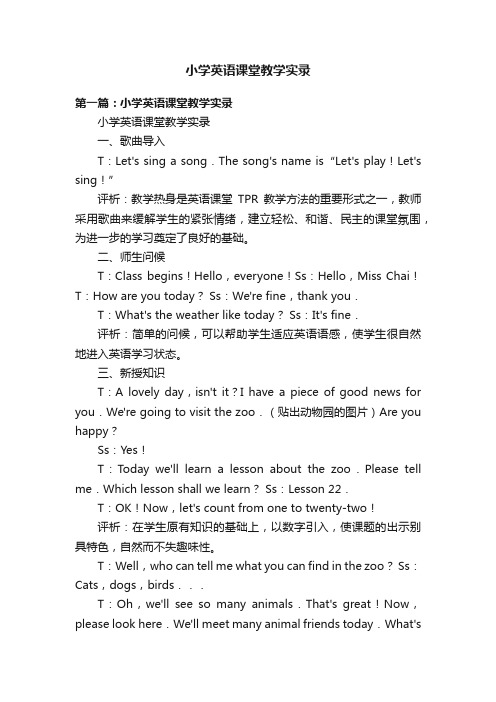
小学英语课堂教学实录第一篇:小学英语课堂教学实录小学英语课堂教学实录一、歌曲导入T:Let's sing a song.The song's name is“Let's play!Let's sing!”评析:教学热身是英语课堂TPR教学方法的重要形式之一,教师采用歌曲来缓解学生的紧张情绪,建立轻松、和谐、民主的课堂氛围,为进一步的学习奠定了良好的基础。
二、师生问候T:Class begins!Hello,everyone!Ss:Hello,Miss Chai!T:How are you today? Ss:We're fine,thank you.T:What's the weather like today? Ss:It's fine.评析:简单的问候,可以帮助学生适应英语语感,使学生很自然地进入英语学习状态。
三、新授知识T:A lovely day,isn't it?I have a piece of good news for you.We're going to visit the zoo.(贴出动物园的图片)Are you happy?Ss:Yes!T:Today we'll learn a lesson about the zoo.Please tell me.Which lesson shall we learn? Ss:Lesson 22.T:OK!Now,let's count from one to twenty-two!评析:在学生原有知识的基础上,以数字引入,使课题的出示别具特色,自然而不失趣味性。
T:Well,who can tell me what you can find in the zoo? Ss:Cats,dogs,birds...T:Oh,we'll see so many animals.That's great!Now,please look here.We'll meet many animal friends today.What'sthis?(出示动物头饰)S:It's a bird.T:Oh,yes.This bird is for you!(S1带上头饰)(以下cat,dog,同上)评析:用学生已经学过的动物引出“What's this?It's...”的新授句型。
译林版牛津英语Now and then 第一课时课堂实录1

Then and now (story time) 课堂实录高邮市城北小学王建芳指教老师:孙雯静T: Class begins.Good morning, boys and girls.Ss: Good morning.T: Sit down, please.T: We know each other well, at first, try to say something about me.S1: You are tall.S2: You have no brothers or sisters.S3: Your birthday is in May.T: When’s your birthday?S3: My birthday is in December.T: Thank you , I see.S4: Your hair is very long.T: I think your hair is long too.S5: Your English name is Sue.T: Yes, my English name is Sue, do you have an english name?S5: Yes, my English name is Jim.S6: You like playing computer games.T: Yes. I like playing computer games, do you lke playing computer games?S6: Yes.T: So we have the same hobby.T: I think you know me well, look at the picture, who’s that?Ss: youT: Yes, it was me, and it was thirty years ago, and what could I do 30 years ago. (Look at some pictures.)T: OK, so I think you know something about me, so judge please.T: Thirty years ago, my hair was long.Ss: False, Thirty years ago, your hair was short.T: Thirty years ago, I could dance.Ss: Yes.T : Thirty years ago, I could speak English.Ss: False. Thirty years ago, you could speak Chinese.T: Thirty years ago, I could teach.Ss: False, Thirty years ago, you couldn’t teach.T: What could I do? Guess.Ss: you could dance/climb/learn/dance/make friends…T: Thitry years ago, I could do many things, but now you see, I have changed a lot. Right?OK, you see lots of changes about me. Today we will see more changes about other people, look at the picture.T: Who are in the picture.Ss: Mike, Mike’s father, Mike’s grandpa, Mike’s mother.T: You can see other new paople here, Mike’s father, Mike’s grandpa, Mike’s mother. What’s the passage about? We will see some changes about them, try to guess, look at the picture.S1: Many years ago, what could they do?S2: What can they do now?T: Yes, so what’s the title of this passage? I’ll give you three choices.A: Mr Brown and his mobile phone.B: Then and now.C: Mike and his family.T: Let’s watch the cartoon, and find out the answers.(watch the cartoon)T: OK, which one do you choose?Ss: B.T: Yes, let’s read it. Then and now.Ss: Then and now.T: And this is our title, today we will talk about “Then and now”. Let’s read it.Ss: Then and now.T: OK, today we will talk about changes about then and now,let’s read about the passage again and think about what are the changes, and please finish the blanks on page38, now open your books and turn to page 38, while you are reading , please finish it ,OK?Ss: Read and write.T: Have you finished?Ss:Yes.T: OK, Now let’s check, this time ,let’s say it in pairs, YangLing and SuYang, one will say the thing past, one will say the things, now talk in pairs.(Students talk in pairs.)T: Let’s try to talk about them, one by one, first about Mike, which pair would you like to try, you two please.S1: Six years ago, Mike couldn’t write,.S2: Bue now, Mike can do many things.T: Thank you . Couldn’t means could not., Mike couldn’t write, what could Mike do six years ago?Ss: He could read and draw.T: And now Mike can do many things, what can he do now?Ss: He can play football/write a lot of English/play computer games…T: So you see Mike do a lot of things now. Let’s read the first part, look at the blackboard, read together, six year ago, one two…Ss: (read)T: (板书:can do many things)T: This is about Mike, what about MrBrown?Ss: Twenty years ago, Mr Brown wrote letters to friends, used the telephone at home and in the office, look at the picture, this is a telephnoe, and now he uses a obile phone.T: Can you say differences about telepnone and mobile phone.S: We use the telephone only in the office and at home, but we use mobile phone everywhere.T: Yes, that’s right. So which one is better, a telepnone or a mobile phone?Ss: A mobile phone.T: Yes, beacause we can use it to call people anywhere, what does this sentence mean? Here, I’ll give you two choices.A. He can call people in the office.B. He can call people no matter where they are.Ss: BT: Let’s read it .Ss: He can call people no matter where they are.T: Now let’s read the part.Ss:(Read the part 2.)T: Next, grandpa, which group will try?S: Thirty years ago, Mike’s grandpa listened to the radio, read newspaper, and now she reads and watches news on the internet and read e-books . Do you know the radio? Do you use the radio now?Ss:NoT: Sometimes maybe. We use it when we drive cars, and the newspaper, do we read the newspaper for new now?Ss: Yes.T: I think, use that, but more and more people read on the internet. Except getting the news, whatelse can we do by the Internet?Ss: Make friends/ play computer games/ get more information/ do shopping/ read e-book…T: We can do a lot of things. What’s difference between book and e-book?S: The book is a paper, and the e-book is a machine,.T: Yes, and usually you can buy a book , that’s cheap, but the book is heavy, but only one e-book, it can include 100 books.T: Let’s read the third part.Ss: (read)T: Next , Mrs Brown.Ss: Thirty years ago, Mrs Brown, mke priends in the school, now Mrs Brown, has friends from all the world, he does shopping on the internet.T: Look at the picture, she has friends from all over the world. What does it mean ? I’ll give you two choices:A: She has e-friends from different countries in the world.B: She has e-friends in China.T: That’s right, let’s read the last part.Ss: (read)T: So we know all the changes about the family, so, what do you think of their life? Why? Let’s read the passage one more time, and think about the question, and this time please read after the tape.Ss: Read after the tape one sentence by one sentence.T: What do you think of their life? Why? You can discuss.Ss: (discuss )T: Who would like to try?S1: Their life is fashion, they like mobile phone.S2: I think their life is changeble, because they changed a lot.S3: I think their life is happy, because they can do many things.S4: I think their life is is morden , because they use a lot of morden things.T: You have a lot of ideas, very good. Now please read the passage one more time, four in a group,Each one chooses a partto read, use the phrases in the blackboard to make a report about your part.Ss: (work in groups)T: Which group can work here?Ss: (read the text)T: Now you know the changes well, try to make more interesting show, our topic today is “now and then”, now who would like to be Mike, Mike’s grandpa, Mike’s father, Mike’s mather, come here.T: Hello.Ss: Hello.T: Grandpa, you are the oldest, can you say the things about 30 yaers ago?S: Thirty years ago, I could read newspapers and listened to music, and now I can use the internet for the news.T: Which one do you like better, the newspapers or the internet, why?S; The internet, I can get more news.T: And Mike, what could you do six years ago?S: Six years ago, I could read and draw.T: What can you do now?S: Now I can write and do lots of things.T: Like?S: Play football, many things.T: And Mike’s mother, do you buy things on the internet or in the shop? S: Internet.T: Why?S; Because it’s much cheap.T: And Mike’s father?S: Yes.T: Are you busy with your work?S: Yes.T: Do you use telephone?S: Yes.T: Do you use mobile phone?S: Yes.T: Do you like telephone or mobile phone better?S: Mobile phone.T: Why?S: Because I can use it everywhere?T: Thank you very much.Please talk in groups.Ss:( talk in groups.)T: Hve you finished?S: No.T: No? hurry up.T: Which group would like to try? Please.S: Welcome to today’s talk show.S: Hello.S: Hello.S: Hello, Mike, what could you do when you were young?S: Six years ago, I could read and draw, but I could not write. S: So can you write now?S: Yes, I can .S: What else can you do now?S: I can play football and do homework.S: Oh, great. Mike’s mum, where do you buy things?S: On the internet.S: Do you like buying things on the internet?S: Yes, I do.S: Why?S: Because it’s convenient.S: Hello, father.S: Hello.S: Did you take your mobile phone today?S: Yes.S: Which do you like ? the mobile phone or the telephone? S: Mobile phone.S: Is it because convenient?S: It’s easy to carry.S: OK.S: So the grandpa.S: Yes.S: Do you often listen to the radio?S: I readthe newspaper, but now I read the news on the internet. S: Because it’s easy yo find the news?S: Yes.T: Thank you.T: Which group want to try? You four please, come here, let’s take a look.S: Welcome, OK, who are you?S: I’m Mike.S: I’m father.S: I’m mother.S: I’m grandpa.S: OK, what could you do?S: I could draw and read.S: What can you do now?S: I can play computer games.S: Thank you. Now ,what about you?S: I connect with my friends and I use the telephone with telephone in my office. But now I have a mobile phone. I can call people anywhere, and aslo I write e-mails.S: OK, do you like mobile or telephone?S: Mobile phone.S: OK, why?S: Because I think it’s better than telephone.S: What about you?S: Thirty years ago, I listened to the radio, and read news on the newspaper, and now I can read them on the internet. And I have an e-book, I’m very very happy.S: OK, how about you?S: Twenty years ago, I made friends at school, and I bought thngs from the shops. But now it’s easy to buy things, I can buy them on the internet. Now I can write e-mails to my e-mail friends.S: So you like write e-mails or write letters?S: Emails.T: thank you, good job.T; Today you did good jobs, after class, please, listen and read the story time, retell story time by P38, bring two photos, and think of the changes between two photos.T: So much for the lesson, class is over. Good bye , boys and girls.Ss: Goodbye.。
七年级英语开学第一节课课堂实录
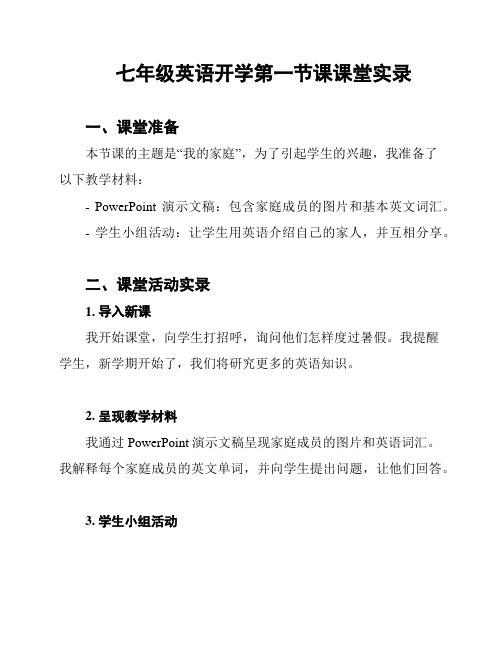
七年级英语开学第一节课课堂实录
一、课堂准备
本节课的主题是“我的家庭”,为了引起学生的兴趣,我准备了
以下教学材料:
- PowerPoint演示文稿:包含家庭成员的图片和基本英文词汇。
- 学生小组活动:让学生用英语介绍自己的家人,并互相分享。
二、课堂活动实录
1. 导入新课
我开始课堂,向学生打招呼,询问他们怎样度过暑假。
我提醒
学生,新学期开始了,我们将研究更多的英语知识。
2. 呈现教学材料
我通过PowerPoint演示文稿呈现家庭成员的图片和英语词汇。
我解释每个家庭成员的英文单词,并向学生提出问题,让他们回答。
3. 学生小组活动
我将学生分成小组,每个小组有四名学生。
我要求每个学生用英语介绍自己的家人,并介绍家人的职业和兴趣爱好。
学生之间互相交流并分享。
4. 分享小组活动成果
每个小组选一名学生代表,向全班分享他们小组的活动成果。
其他学生可以提出问题或进行评论。
5. 总结与作业布置
我对学生的活动表现进行总结,并对他们的表现给予肯定。
我布置家庭成员的英语写作作业,要求学生用英语写一篇关于自己家人的短文。
三、课堂反思
此次课堂活动中,学生积极参与,通过小组合作的方式,提高了他们的口语表达能力。
学生们对课堂内容表现出浓厚的兴趣,并对彼此的家庭情况进行了交流。
需要注意的是,部分学生在口语表达时存在一些困难,需要在后续的课程中加强口语训练。
以上是七年级英语开学第一节课的课堂实录,希望本节课对学生的英语研究起到了积极的推动作用。
初中英语课堂实录
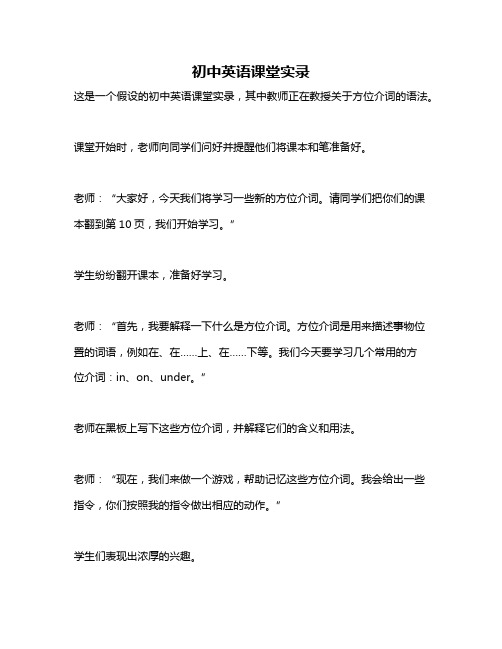
初中英语课堂实录这是一个假设的初中英语课堂实录,其中教师正在教授关于方位介词的语法。
课堂开始时,老师向同学们问好并提醒他们将课本和笔准备好。
老师:“大家好,今天我们将学习一些新的方位介词。
请同学们把你们的课本翻到第10页,我们开始学习。
”学生纷纷翻开课本,准备好学习。
老师:“首先,我要解释一下什么是方位介词。
方位介词是用来描述事物位置的词语,例如在、在……上、在……下等。
我们今天要学习几个常用的方位介词:in、on、under。
”老师在黑板上写下这些方位介词,并解释它们的含义和用法。
老师:“现在,我们来做一个游戏,帮助记忆这些方位介词。
我会给出一些指令,你们按照我的指令做出相应的动作。
”学生们表现出浓厚的兴趣。
老师:“请把书放在桌子上。
”学生们纷纷把书放在桌子上。
老师:“很好。
现在请把笔放在书的上面。
”学生们按照老师的指示把笔放在书的上面。
老师:“接下来,请把铅笔盒放在书的下面。
”学生们把铅笔盒放在书的下面。
老师:“最后,请把书包放在桌子的里面。
”学生们把书包放在桌子的里面。
老师:“非常好!通过这个游戏,你们应该已经很好地掌握了这些方位介词的用法。
现在请你们合上书本,我们来做一些练习题。
”学生们合上书本,拿出练习本和笔。
老师分发练习题,学生们开始认真地做题。
老师在教室里走动,回答学生提出的问题,并纠正他们的错误。
练习题完成后,老师收集起来批改,然后进行讲解和总结。
老师:“好的,同学们,通过今天的练习,你们已经掌握了这些方位介词的用法。
希望大家能够在日常生活中运用这些知识,更好地描述事物位置。
下节课我们将继续学习其他有用的方位介词。
下课!”。
- 1、下载文档前请自行甄别文档内容的完整性,平台不提供额外的编辑、内容补充、找答案等附加服务。
- 2、"仅部分预览"的文档,不可在线预览部分如存在完整性等问题,可反馈申请退款(可完整预览的文档不适用该条件!)。
- 3、如文档侵犯您的权益,请联系客服反馈,我们会尽快为您处理(人工客服工作时间:9:00-18:30)。
英语课堂实录(Senior English Book 5)
临清工业学校于小燕 Module 2 A Job Worth Doing
The First Period (第一课时)
Step1 Introduction
1.教师:大家请看多媒体大屏幕的六幅图片,现在我们两人为一组来进行讨论:What are the people doing in the photos?
学生讨论以后,回答:
The doctor is examining the old woman.
The manager is talking about the problems with the employees.
The electrician is examining the wares.
The biochemist is making an experiment.
……
2.教师:大家做的很好,下面请看大屏幕上的一些词汇。
badly paid dangerous exciting intellectual
well paid manual satisfying stressful
请大家用以上的词汇描绘照片上的人所从事的工作。
学生:(讨论后踊跃发言)
The manager is intellectual and stressful.
The pilot’s job is exciting but dangerous.
The biochemist is intellectual.
The electrician’s job is very dangerous.
…
3.教师:I think you must like one job best. Now let us discuss in pairs: what sort of job would you like to do?
学生:(讨论后用自己的话来回答)
I want to do a job which helps other people, such as a doctor.
I want to do a job which is very interesting and exciting, such as, a
football player.
I want to do a job which is a little dangerous, because I like to risk.
I like to be a teacher, because I like to stay with children.
I like to be a pilot, because I want to fly freely like a bird in the sky.
I like to be a biochemist, because I prefer to make experiments.
……
Step2 Reading and Practice
1.教师:大家看一下大屏幕上的这个人在做什么?
Do you think what the man is doing?
学生:(讨论后回答)
Maybe the man is directing the traffic.
2.教师:请默读课文,验证答案。
学生:读课文,确认答案。
Yes, the man is directing the traffic.
3.教师:请大家精读课文,理解课文的细节,回答问题。
1) Why did the man direct the traffic there?
2) Could he get paid from the job?
3) What made him do the job?
学生:默读课文,进行小组讨论,找出问题的答案。
1) Because many accidents happened there.
2) No, he got nothing from the job.
3) The experience he had helping people in a bus crash made him start this
job.
4.教师:大家回答的很好,说明大家对课文已经基本理解,下面我们来完成Activity4 和Activity5。
学生:读课文回答。
Activity4:
1)c. He is a volunteer who directs the traffic.
2)b. At a side of the road.
3)a. It is narrow and in bad conditions.
4)c. No money at all.
5)c. The experience he had helping people in the bus crash.
6)b. He felt he must do it.
Activity5:the keys ( present them on the screen)
Step3 Discussion
教师:OK.大家做的都很好,下面请大家分组讨论下面一个问题:
Do you think his job is worth doing? Why?
学生:讨论后踊跃发言:
I think the man is great.
I think the man is doing a great job.
I think his job is worth doing.
We must learn from the man.
…
Step4 Summary
教师:这一节我们主要学习了一些有关“job”的一些词汇,大家一起讨论了什么样的工作是重要的,什么样的工作才是值得做的、是有意义的。
希望大家通过今天的学习,能够树立正确的人生观和价值观,正确看待金钱。
Step5 Homework
教师:好,今天的课就上到这里,给大家布置的作业是:
1.复习今天课上所讲的内容,课下大家还可以针对该话题继续展开讨论。
2.以“什么工作是有意义的”为主题,写一篇作文。
3.预习下一个模块“Grammar”。
